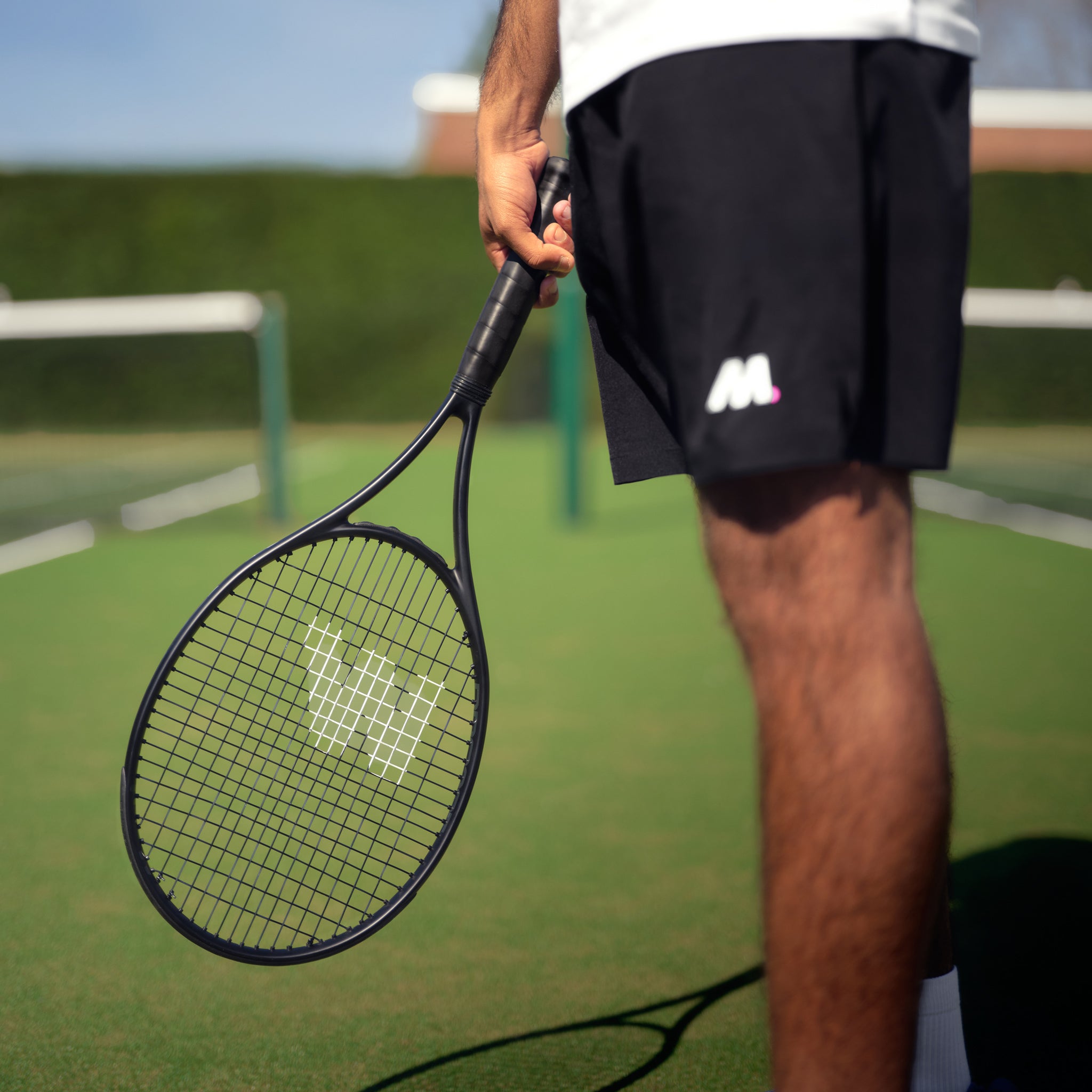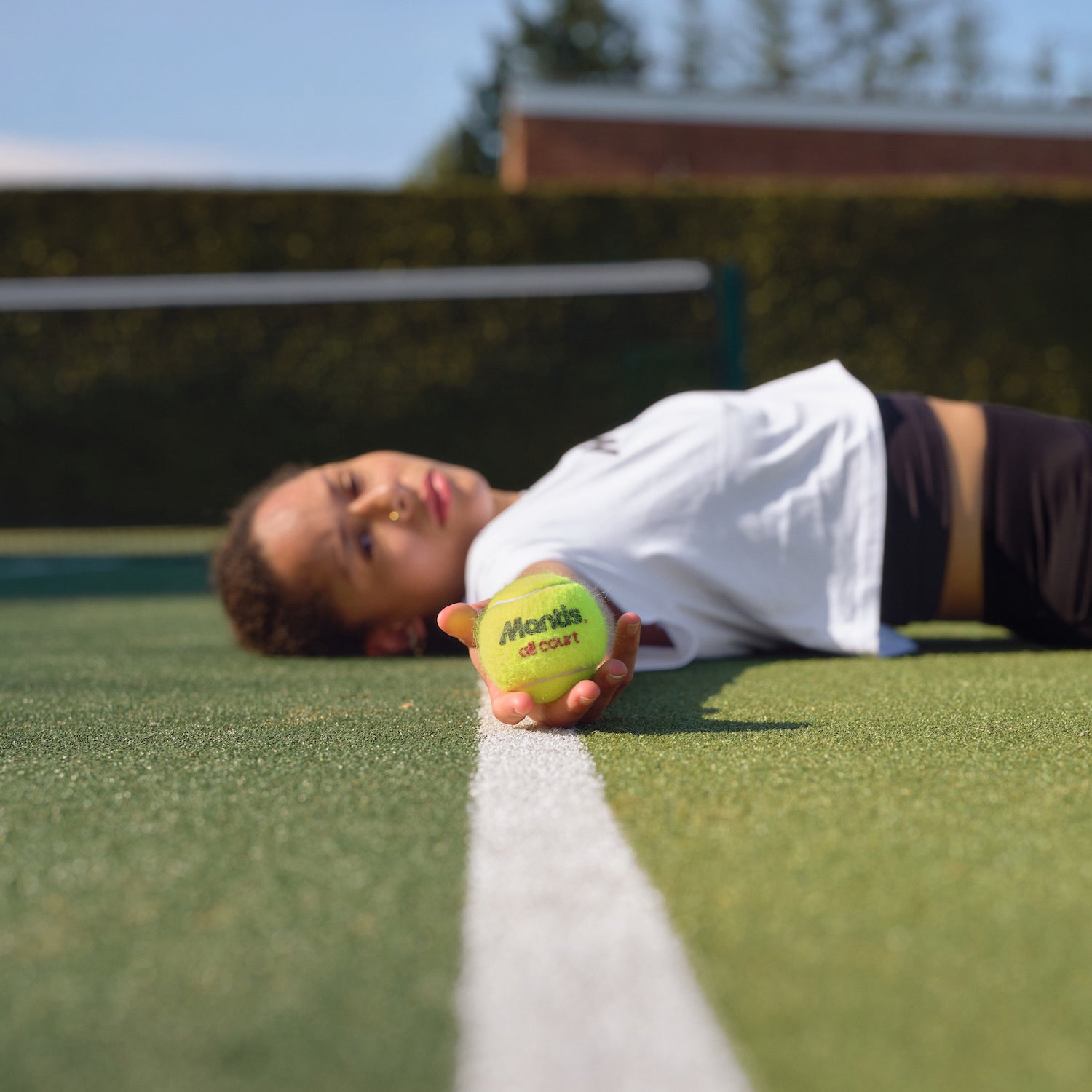
When you hear the term 'mental toughness', what comes to mind? For us at Mantis, it's all about building the resilience to handle pressure, stare down setbacks, and stay completely locked in on your goals. It's the art of controlling your emotions, staying committed when things get tough, and seeing every challenge as a chance to grow. To get a deeper look into how the best in the business cultivate this, check out our article exploring why the professional tennis circuit creates the toughest athletes.
It's a skill we know is absolutely vital for success, not just in sport, but in life.
Understanding Its Critical Role Today
In a world that never seems to slow down—packed with professional deadlines and personal expectations—mental toughness isn't just a nice-to-have for athletes anymore. It’s become a fundamental life skill. It’s that psychological edge that helps you push through adversity instead of being overwhelmed by it.
Here at Mantis, we don't see this skill as something you're born with. It's something you can train and develop, just like a muscle. It’s about building an internal toolkit that helps you stay calm and think clearly, even when everything around you feels chaotic.
The Foundation of Resilience
At its heart, mental toughness is your ability to bounce back from a failure or a disappointment without losing your stride. This isn't about pretending negative emotions don't exist; it's about acknowledging them, processing them, and not letting them take over the driver's seat.
This resilience stands on a few key pillars:
- Emotional Control: The skill to manage feelings like stress, frustration, or doubt so you can keep your focus where it needs to be.
- Unwavering Commitment: The drive to stay dedicated to your goals, especially on the days when motivation is low and obstacles are high.
- Challenge as Opportunity: The crucial mindset shift that reframes setbacks from being roadblocks into valuable learning experiences.
The need for these skills is especially clear when you look at the UK's current mental well-being landscape. Recent data shows that roughly 1 in 4 adults in England will face a mental health problem each year. It’s a statistic that really drives home the urgent need for strategies that build personal resilience.
Even more specifically, young women aged 16 to 24 are at the highest risk, with around 28.2% experiencing a common mental disorder. This highlights just how important it is to start building these skills early.
For Mantis, building mental toughness is about proactively arming yourself with the psychological framework to not just survive hardship, but to actually thrive because of it. It’s the difference between being fragile and being resilient.
The Four Pillars of Mental Fortitude
To really build mental toughness, you need a roadmap. Here at Mantis, we anchor our coaching in a brilliant psychological model known as the 'Four Cs'. This isn't just theory; it breaks down mental fortitude into four distinct, trainable pillars. When they work together, they forge a truly unshakeable resilience.
Thinking about it this way stops 'mental toughness' from being some vague, unattainable idea. Instead, it becomes a set of concrete skills you can actively work on. Let's dig into each pillar and see how they show up on the court.
Mastering Control
First up is Control. This is all about knowing what you can influence and, just as importantly, what you can't. The real secret is pouring your energy into your own actions, thoughts, and preparation, rather than letting it drain away worrying about things like your opponent’s lucky shots or a sudden gust of wind.
Picture this: you get a terrible line call from the umpire at a crucial moment. The mentally tough player feels that flash of anger—that's normal—but instantly shifts focus back to their breathing and their pre-serve routine. They focus on what they can do next, preventing one bad call from unravelling their entire match.
"True power lies not in controlling the world around you, but in mastering the world within you. This is the essence of the Control pillar—a disciplined focus on your own responses."
The Power of Commitment
Next, we have Commitment. This is your 'why'. It's the deep-seated drive that keeps you going when things get tough, boring, or just plain exhausting. Commitment is what pushes you to see a goal through to the end, staying true to your purpose no matter what.
It’s about those endless drills and long hours on the practice court. Commitment is what drags you out of bed for a 6 am session when you'd much rather stay under the covers. It’s that powerful reason behind your actions that simply outweighs any temporary discomfort or dip in motivation.
Reframing Challenge
The third pillar, Challenge, requires a huge mental shift. Instead of seeing pressure, mistakes, or a tough draw as threats, mentally tough athletes learn to view them as opportunities. Every unforced error becomes a piece of feedback, and every high-stakes match becomes a test to rise to.
Think of a player who just lost a nail-biter of a match. Rather than stewing over the loss, they treat it like data. They break down what went wrong, pinpoint specific areas to sharpen in their training, and come back to the next tournament a stronger player. This perspective turns a painful loss into a powerful catalyst for growth.
Building Unshakeable Confidence
And finally, there's Confidence. This isn't about being loud or arrogant. It's a quiet, solid self-belief built on a foundation of hard work and experience. It's the trust you have in your own ability to handle whatever the match throws at you, because you know you've put in the hours.
You build this kind of confidence brick by brick through:
- Thorough Preparation: The calm assurance that comes from knowing you’ve done everything possible to be ready.
- Celebrating Small Wins: Actively acknowledging your successes, no matter how small, to reinforce your competence.
- Positive Self-Talk: Catching that negative inner voice and replacing it with proof of what you're capable of.
Of course, your mind doesn't operate in a vacuum. Mental strength is heavily influenced by your physical state. A healthy body supports a sharp mind, which is why understanding the importance of nutrition for mental focus is another key piece of the puzzle.
Actionable Exercises to Build Your Resilience
Knowing the theory behind mental toughness is a great start, but the real magic happens when you put it into practice. At Mantis, we see resilience as a muscle – it gets stronger with consistent training. Just like you hit the gym to build physical strength, these mental drills are your workouts for a tougher mind. In fact, the two are deeply connected, as we explore in our guide to effective tennis strength training.
Moving from theory to action is the single most important step. It’s all about creating small, daily habits that add up to big, lasting changes on and off the court.
The Power of Cognitive Reframing
One of the best techniques you can learn is Cognitive Reframing. It’s a simple but powerful exercise that teaches you to challenge and redirect those unhelpful, negative thoughts that can creep in. Instead of just accepting a negative thought as the absolute truth, you learn to step back, question it, and find a more productive way of looking at the situation.
Let's say you've just had a rough match. Your immediate thought might be, "I'm just not good enough." Cognitive reframing is the process of catching that thought and consciously changing it to something more useful. For instance: "That wasn't my best performance, but it clearly showed me I need to work on my backhand under pressure."
See the difference? That simple shift turns a moment of self-doubt into a clear, actionable plan.
This isn't about toxic positivity or pretending a bad loss was a good thing. It's about consciously choosing a perspective that empowers you to improve rather than one that keeps you stuck in a rut.
A great way to get started is with a five-minute reframing journal before bed. Just jot down one negative thought you had during the day and actively write down a more balanced or constructive alternative next to it.
This practice helps turn swirling thoughts into structured insights, which is exactly what cognitive reframing helps you do.
Preparing for Pressure with Stress Inoculation
Next up is Stress Inoculation Training (SIT). Think of this as a proactive strategy to mentally prepare yourself for those high-stakes moments before they even happen. The idea is to gradually expose yourself to manageable bits of stress in a controlled setting, which helps you build up a kind of psychological immunity.
It’s a bit like a vaccine for stress. You build tolerance by practising under simulated pressure. For a tennis player, this could mean playing practice sets where you always start the score at 5-5 in the final set. You get used to managing the nerves that come with a tie-break situation, so it feels less overwhelming in a real match.
This kind of self-managed resilience is more important than ever. In the UK, with reports showing over 16,500 people in England waiting more than 18 months for mental health treatment, developing your own mental toughness skills can be an essential lifeline.
Using Visualisation to Rehearse Success
Finally, let’s talk about Visualisation. This is a technique that elite performers in every field swear by, and for good reason. It involves creating a rich, detailed mental movie of yourself successfully handling a challenge. You don't just see it; you feel the emotions, hear the sounds of the court, and experience the physical sensations of achieving your goal.
Here’s how you can use it:
- Before a Match: Spend ten minutes picturing yourself executing a perfect serve, moving with effortless speed across the court, and staying completely calm and focused during a tough rally.
- During a Difficult Drill: Mentally rehearse the footwork or the swing, imagining yourself performing it flawlessly and confidently, feeling the smooth rhythm of the movement.
This mental rehearsal primes your brain for success. When the actual moment arrives, it feels more familiar and less intimidating because, in your mind, you've already been there and done it successfully.
Many of these strategies work beautifully alongside practices like meditation.
Your Weekly Mental Toughness Training Plan
To make this all feel less abstract, here’s a sample weekly schedule. The goal is consistency, not intensity. Even a few dedicated minutes each day can make a massive difference over time.
| Day | Morning (10 mins) | Afternoon (5 mins) | Evening (15 mins) |
|---|---|---|---|
| Monday | Visualise a successful week of training. | Quick breathing exercise before practice. | Journal: Reframe one negative thought from the day. |
| Tuesday | Meditate, focusing on body sensations. | Review one personal goal. | Visualise successfully executing a difficult shot. |
| Wednesday | Set a clear intention for today's practice. | Midday mindfulness break (focus on breathing). | Journal: Note one thing you handled well under pressure. |
| Thursday | Visualise a tough match scenario and your calm response. | Quick breathing exercise. | Meditate, focusing on letting thoughts pass. |
| Friday | Review your progress for the week. | Remind yourself of your core strengths. | Journal: Reframe a moment of frustration from practice. |
| Saturday | (Match Day) Visualise your pre-match routine and key points. | Between-point reset routine practice. | Reflect on performance, focusing on effort not outcome. |
| Sunday | Rest Day – Light meditation or gentle stretching. | Mindfulness walk (no phone). | Plan goals for the upcoming week. |
This table is just a template, of course. Feel free to adapt it to fit your own schedule and needs. The key is to start building these exercises into your daily life until they become as natural as lacing up your tennis shoes.
Putting Your Mental Toughness to the Test on the Court
Drills and exercises are one thing, but the real measure of mental toughness is how you perform under pressure. This is where all that off-court training truly shows its worth, turning abstract ideas into match-winning actions when the stakes are highest.
Think of it as moving your mental skills from the practice court of your mind to centre court during a tie-break. Let’s look at a few common tennis scenarios and compare how a player might react with and without this mental training.
Facing a Critical Break Point
You’re serving at 4-4, 30-40 in the deciding set. The match could swing either way on this single point. The crowd is tense, and you can feel the weight of the moment.
- Untrained Response: Panic starts to creep in. Your heart pounds, your arm feels tight, and your mind races with negative thoughts like, “Don’t double fault!” You rush your service motion, trying to get the point over with, and either make an unforced error or hit a weak serve that your opponent pounces on. The pressure got the better of you.
- Mentally Tough Response: You feel the nerves, but you recognise them as a sign that you’re in a big moment. You take a deliberate, deep breath behind the baseline, bouncing the ball a couple more times than usual to reset. You focus on your pre-planned routine, visualise where you want the serve to go, and commit to the shot. You’ve trained for this. You're in control of the moment, not the other way around.
That small gap—the one between the pressure hitting you and your reaction—is where matches are won and lost. Mental toughness gives you the power to choose a constructive action instead of an emotional reaction.
Recovering After Losing a Set You Should Have Won
We’ve all been there. You were up 5-2 with set points, and somehow, you lost the set 7-5. It’s a gut punch.
The immediate feeling is pure frustration and disappointment. A player without resilience might carry that negativity into the next set. Their shoulders slump, their footwork gets lazy, and they start making more errors, still mentally replaying the points they lost. The setback has completely derailed their game.
A mentally tough player, however, allows themselves a moment of frustration between sets—they don’t ignore the feeling. But then they actively reset. They sit down, towel off, and maybe take a few sips of water while focusing on their breathing. They treat the lost set as history and start analysing what needs to change. The setback becomes valuable feedback, not a reason to give up. They come out for the next set with a fresh game plan.
Dealing With a Bad Line Call in a Tie-Break
It's 5-5 in a crucial tie-break. You hit a clear winner down the line, but your opponent calls it out. There’s no umpire to overrule it.
For many, this is where the red mist descends. Anger takes over. You might start arguing, lose your focus, and let the injustice consume your thoughts. This emotional spiral almost guarantees you'll lose the next few points, and with them, the match. The bad call has thrown you completely off your game.
Someone who has practised emotional control sees it differently. They feel the flash of anger, but they’ve prepared for this exact scenario. They might calmly question the call once, but they quickly accept it and turn their attention to the next point. They use a quick mental cue, like visualising themselves wiping a slate clean, to let the frustration go. They know the only point that matters is the next one. This is mental toughness in action—using proven tools when the pressure is at its peak.
Turning Mental Resilience Into a Lifelong Habit
Building real mental toughness isn't something you do once and then tick off a list. It's a journey, not a destination. Here at Mantis, we see the real goal as weaving resilience so deeply into your fabric that it just becomes part of who you are. The final piece of the puzzle is moving from actively doing mental exercises to simply being a mentally tough person. That's all about sustainable habits, not short bursts of intensity.
What does that look like in practice? Consistency. It’s not about one heroic effort on the court but the small, deliberate choices you make every single day. Think of it as creating your own personal 'resilience routine'. This could be as simple as a five-minute reflection in the morning or consciously reframing a challenge during your commute home.
Build Your Resilience Squad
The people and places you surround yourself with have a massive impact on your ability to stay mentally strong. It’s crucial to consciously choose an environment that supports your growth and challenges you in a positive way. A solid support system acts as a buffer when things get tough and a sounding board for your progress.
Here are a few ways to do that:
- Find mentors: Look for people who already have the kind of resilience you're aiming for. Learn from their stories and experiences.
- Share your goals: Let trusted friends or family in on what you're working on. They can offer encouragement and help keep you accountable.
- Cut out the noise: Pay attention to relationships or environments that constantly drain your energy or pull you back into unhelpful ways of thinking.
The most resilient people we've ever met don't go it alone. They build a network that reinforces their strength, because they know that shared determination is far more powerful than isolated effort.
Learn to Be Your Own Ally
True resilience has nothing to do with being relentlessly hard on yourself. Actually, self-compassion is a game-changer. When you inevitably face a setback, treating yourself with a bit of kindness rather than harsh criticism is what helps you bounce back faster. Acknowledge the disappointment, see what you can learn from it, and then move on without the heavy weight of self-blame.
Regular self-reflection is the tool that makes this possible. Carving out time to review your progress, celebrate the small wins, and honestly analyse your setbacks is how you start to understand your own patterns. This simple practice is what turns raw experience into genuine wisdom, making sure your mental toughness deepens over time.
Finally, knowing when to ask for professional help is a sign of immense strength, not weakness. In the UK, the need for these skills is becoming more apparent every day. Mental health service referrals in England hit a record 5.2 million in 2024. That huge increase really shines a light on why we all need proactive strategies to build our resilience. Learning these skills can empower you to manage psychological stress before it becomes overwhelming.
Frequently Asked Questions
It’s completely normal to have questions when you start working on your mental game. After all, you're training your mind, not just your muscles. Let’s tackle some of the most common ones we hear from players just like you.
Can Anyone Really Develop Mental Toughness?
Yes, absolutely. Think of it less as a personality trait you either have or don't, and more like a skill. Just like you can build a stronger serve or a more reliable backhand through practice, you can build mental resilience.
Some people might have a head start, seeming naturally composed under pressure. But everyone has the capacity to sharpen their mental game. It just takes the right drills and consistent effort. The frameworks in this guide are your starting point for unlocking that potential but you can also read more thanks to this great source of tennis industry information
Many players mistakenly believe you're either born mentally tough or you're not. The truth is, it's a skill that can be trained and strengthened over time through dedicated practice, just like any other part of your tennis game.
How Quickly Will I See Results?
There isn't a magic number, and everyone’s journey is unique. That said, if you consistently practise techniques like visualisation or cognitive reframing every day, you could start feeling a real shift in your mindset on court within just a few weeks.
The trick is to see this as an ongoing process, not a quick fix. Lasting mental toughness is built layer by layer, match by match, over months and years. Eventually, these new habits become second nature.
Does This Mean I Have to Suppress My Emotions?
Not at all. This is a crucial point to understand. Mental toughness isn't about being a robot and ignoring your feelings. It's about emotional regulation—learning to acknowledge your emotions without letting them hijack your game.
Mentally tough players still feel frustration after a double fault or nerves on a break point. The difference is they have the tools to manage those feelings, stay focused on the next point, and make smart decisions when the pressure is on.
I’m Feeling Completely Overwhelmed. Where Should I Start?
When you feel overwhelmed, the best thing to do is shrink your focus. Go back to what you can control, right here, right now. Forget about the match outcome for a moment and concentrate on one small, manageable action.
This could be as simple as:
- Taking three deep, deliberate breaths before your next serve.
- Focusing solely on watching the ball onto your strings for one rally.
- Tidying your tennis bag for five minutes before you leave the club.
These small wins build momentum. They restore your sense of control and create a solid foundation, giving you the confidence to tackle the bigger challenges one point at a time.
At Mantis, we believe that the right mindset and the right equipment go hand in hand. Our gear is built for players dedicated to improvement, who know that every detail makes a difference.
Discover our range of performance rackets, balls, and accessories designed to support your game.










